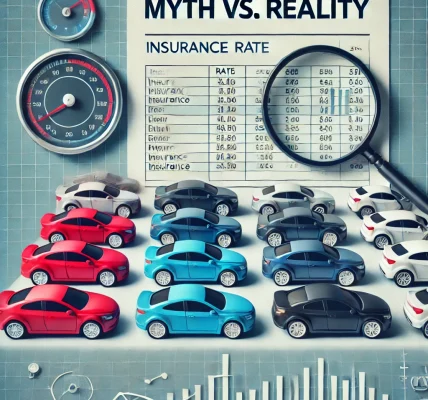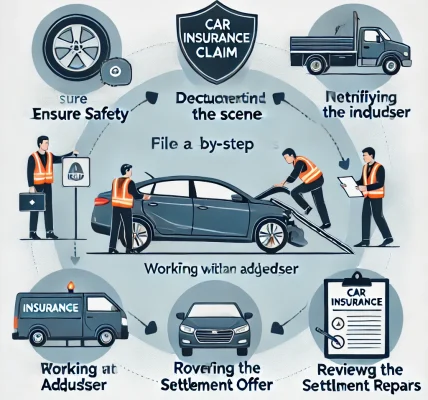Artificial Intelligence (AI) is transforming various industries, and the car insurance sector is no exception. Insurers are leveraging AI to streamline processes, assess risks more accurately, detect fraud, and provide personalized policies. This technological advancement is revolutionizing traditional insurance models and improving the customer experience.
In this article, we will explore how AI is shaping modern car insurance policies, its benefits, challenges, and what the future holds for AI-driven insurance.
How AI is Transforming Car InsuranceAI is playing a pivotal role in modernizing car insurance policies by automating tasks and analyzing large datasets to enhance decision-making. Below are the key areas where AI is making a significant impact:
- AI-Powered Risk Assessment & UnderwritingTraditionally, car insurance premiums were based on factors like age, driving history, vehicle type, and location. AI is now enabling insurers to assess risks more accurately by analyzing real-time data from sources such as:
Telematics devices and GPS trackers to monitor driving habits.
Traffic and weather conditions that may impact accident probabilities.
Social and behavioral data to predict risk levels more effectively.
Using AI-powered predictive analytics, insurers can personalize premiums based on an individual’s actual driving behavior rather than relying solely on broad demographic factors. - Automated Claims ProcessingOne of the most time-consuming aspects of car insurance is filing and processing claims. AI has revolutionized this process through:
Image recognition technology: AI can analyze accident photos to assess damages and estimate repair costs instantly.
Chatbots and virtual assistants: Customers can file claims, receive status updates, and resolve queries without human intervention.
Fraud detection algorithms: AI detects inconsistencies in claims and flags suspicious activity, reducing fraudulent payouts.
By automating these processes, insurance companies reduce processing times from weeks to mere hours, improving customer satisfaction. - Fraud Detection and PreventionFraudulent claims cost insurance companies billions of dollars annually. AI helps identify and prevent fraud by:
Analyzing past fraudulent patterns to detect anomalies in new claims.
Monitoring policyholder behavior for inconsistencies.
Verifying claim authenticity using AI-powered forensic tools.
With AI’s machine learning capabilities, insurers can continuously improve fraud detection systems, saving money and ensuring fair policy pricing for honest customers. - AI-Driven Chatbots for Customer SupportAI-powered chatbots have become essential for customer service in the car insurance industry. These virtual assistants can:
Provide instant responses to customer queries 24/7.
Assist with policy purchases and renewals.
Guide customers through the claims process.
Offer personalized recommendations based on customer data.
AI chatbots enhance the customer experience by reducing wait times and improving efficiency. - Usage-Based Insurance (UBI) with AI TelematicsAI-driven telematics technology is revolutionizing car insurance by tracking real-time driving behavior. Usage-based insurance (UBI) allows policyholders to pay premiums based on how they drive rather than traditional static factors.
How AI-driven UBI works:
AI collects data from onboard telematics devices or mobile apps.
It assesses factors such as speed, acceleration, braking, and driving frequency.
Policyholders with safe driving habits receive discounts, encouraging better road safety.
This fair and transparent pricing model benefits responsible drivers and promotes safer driving practices. - AI-Enhanced Vehicle Safety and Accident PreventionInsurance companies are integrating AI with Advanced Driver Assistance Systems (ADAS) to reduce accident risks. AI helps with:
Collision warnings and automatic braking systems.
Lane departure alerts to prevent accidents.
Driver monitoring systems to detect drowsiness or distractions.
By leveraging AI in vehicle safety technology, insurers can lower accident rates and insurance claims.
Benefits of AI in Car InsuranceAI brings several advantages to both insurers and policyholders:
✅ Faster Claims Processing – Automating claims reduces wait times, leading to quicker settlements.
✅ Personalized Pricing – AI tailors premiums based on individual risk profiles rather than generalized factors.
✅ Fraud Prevention – AI minimizes fraudulent claims, reducing losses for insurers and policyholders.
✅ Improved Customer Service – Chatbots and virtual assistants provide real-time assistance.
✅ Encourages Safer Driving – AI-driven telematics rewards responsible drivers with lower premiums.
Challenges and Ethical Concerns of AI in Car InsuranceDespite its benefits, AI in car insurance also presents some challenges and ethical concerns:
🚨 Privacy Issues – AI collects vast amounts of data, raising concerns about how personal information is stored and used.
🚨 Algorithm Bias – If AI models are not trained correctly, they may lead to unfair risk assessments.
🚨 Job Displacement – Automation in claims processing and customer support could impact employment in the insurance sector.
🚨 Cybersecurity Risks – Increased reliance on AI makes insurance companies potential targets for data breaches.
To address these concerns, strict regulations and ethical AI practices must be implemented.
The Future of AI in Car InsuranceAI’s role in car insurance will continue to evolve in the coming years. Some future trends include:
🚀 Blockchain Integration – AI-powered smart contracts on blockchain networks for secure transactions.
🚀 AI-Powered Predictive Analytics – More accurate risk assessment models for fairer pricing.
🚀 Autonomous Vehicles and AI Insurance – Insurance policies tailored to self-driving cars.
🚀 Real-Time Policy Adjustments – AI-based dynamic pricing based on live driving behavior.
As AI technology advances, it will create a more efficient, cost-effective, and customer-centric insurance ecosystem.
Final ThoughtsArtificial Intelligence is redefining the car insurance industry, offering faster claims processing, personalized pricing, fraud detection, and safer driving incentives. While AI brings numerous benefits, it also raises concerns about privacy, fairness, and cybersecurity.
For policyholders, AI-driven insurance means greater transparency, fair pricing, and improved customer service. However, it’s essential to stay informed about how AI influences your premiums and data security.
As AI continues to advance, the future of car insurance will be smarter, more efficient, and more customer-friendly than ever before.
Would you consider an AI-powered insurance policy? Share your thoughts in the comments below!



